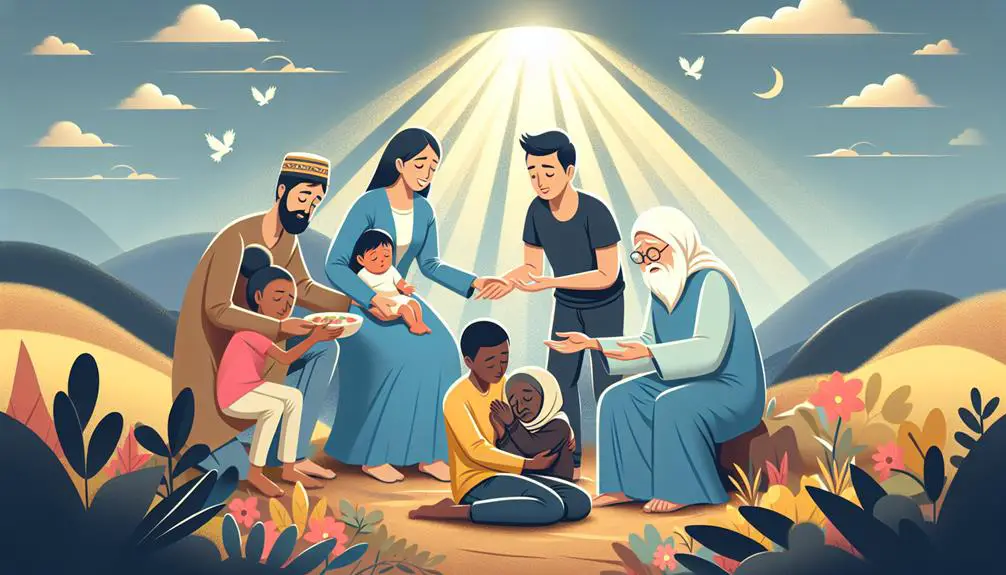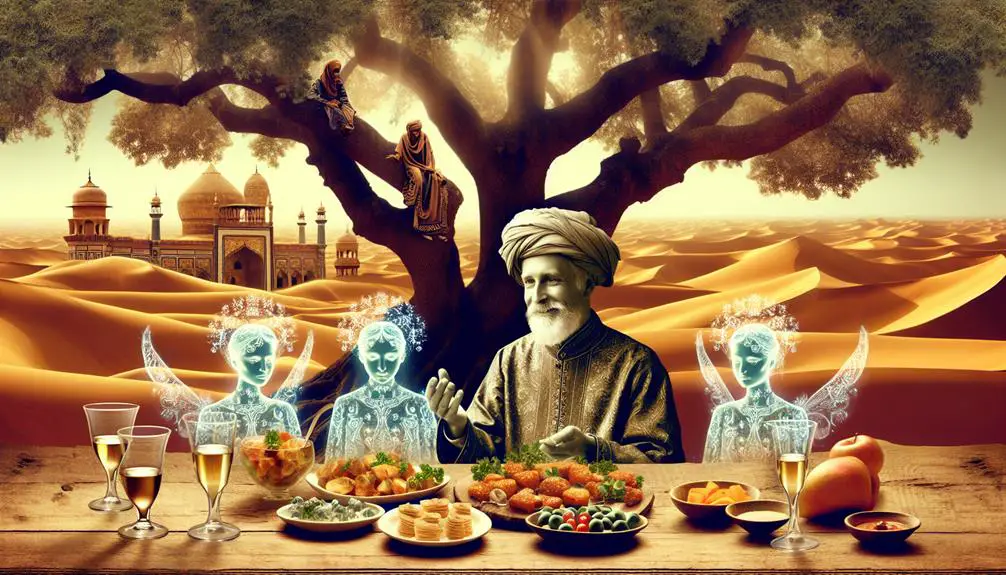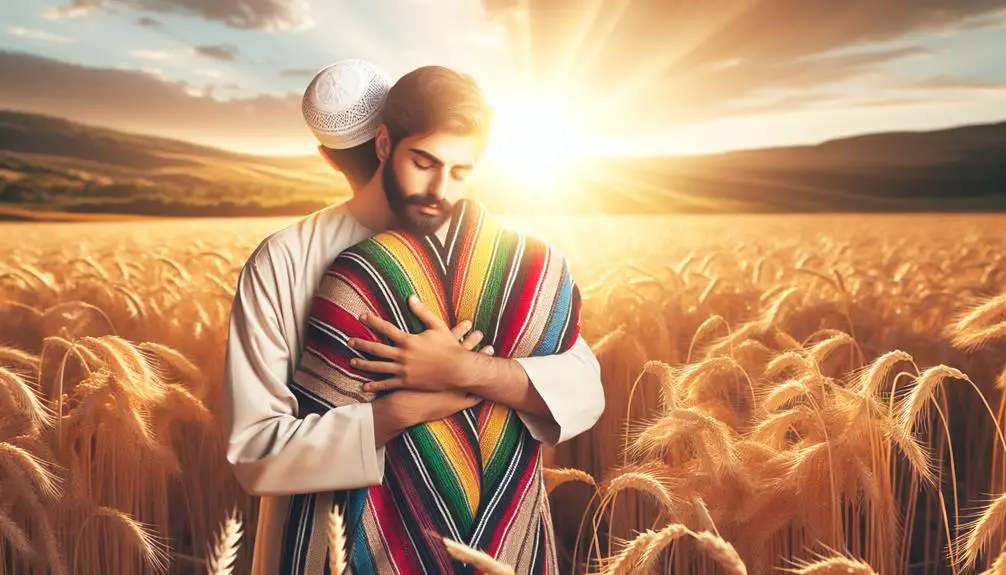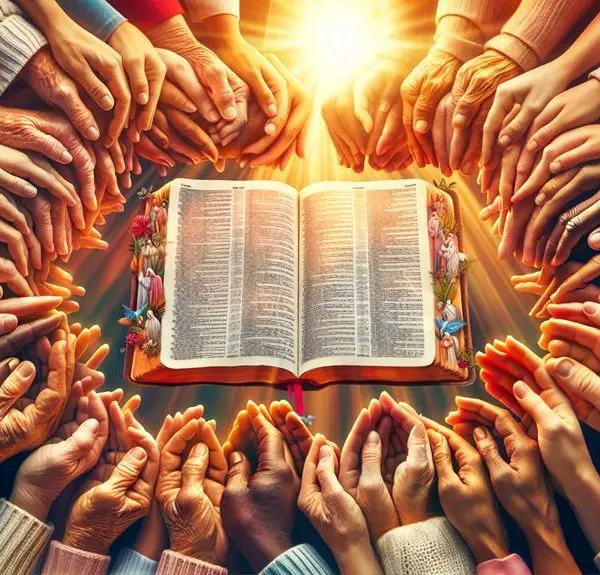An exploration of biblical good deeds, from the Good Samaritan to Esther, reveals timeless lessons in kindness and courage.

Examples of Good Deeds in the Bible
Did you know that over 60% of the world's population identifies with a religion that holds the Bible in high esteem? It's fascinating to consider, especially when you explore the rich tapestry of good deeds woven throughout its pages.
From the Good Samaritan's mercy to Esther's courageous intervention, these stories aren't just ancient texts; they're blueprints for kindness in our modern world. You're likely familiar with some of these tales, but there's always more to uncover about the profound impacts of these acts.
Let's explore together how these timeless examples can inspire today's actions and decisions, shall we?
Key Takeaways
- Biblical stories highlight the importance of showing mercy and hospitality across societal divides.
- Forgiveness and reconciliation are central themes, illustrating the healing power of forgiving others.
- Courage and empowerment in the face of adversity demonstrate the impact of individual actions on society.
- Wisdom, faith, and discipline in spiritual practices can lead to profound societal and personal transformation.
The Good Samaritan's Mercy

In the parable of the Good Samaritan, Jesus illustrates the profound impact of showing mercy to those in need, regardless of societal divisions. This narrative is a compelling demonstration of how compassionate action transcends cultural boundaries, urging you to reflect on the universal values of empathy and kindness. The Samaritan, belonging to a group traditionally seen with contempt by Jews, emerges as the embodiment of true benevolence, challenging the prejudices and expectations of Jesus' audience.
Analyzing this parable, you'll notice that it's not just about the act of helping someone in distress; it's a profound critique of societal norms that often discourage crossing cultural lines to extend kindness. The priest and the Levite, despite their religious obligations, ignore the wounded man, highlighting how societal roles and expectations can sometimes hinder the impulse to help. In contrast, the Samaritan's decision to help is driven purely by compassion, making no calculations based on the victim's identity or potential reciprocation.
This narrative encourages you to look beyond the superficial divisions that society imposes and recognize the common humanity that binds everyone. The Good Samaritan's mercy is a powerful call to action, advocating for a world where compassionate actions aren't limited by cultural boundaries. It's a reminder that at the heart of many religious and ethical systems is the call to treat others with kindness, especially those who are most vulnerable.
Abraham's Hospitality

Reflecting on the theme of compassion in biblical narratives, another profound example is found in the story of Abraham's hospitality towards strangers. This account, rich in lessons, showcases the importance of guest welcoming as a fundamental expression of kindness. Abraham's actions serve as a timeless beacon of how to treat others, emphasizing the potential impact of our deeds on both the physical and spiritual realms.
When three strangers approach Abraham's tent in the heat of the day, he doesn't hesitate. His immediate response is to offer shelter and sustenance, embodying the essence of hospitality without reservation. You'll notice Abraham rushes to provide the best he has, instructing Sarah to prepare fresh bread and selecting a choice calf for the meal. This level of attentiveness and generosity speaks volumes, illustrating that hospitality isn't just about meeting basic needs but about enriching the guest's experience.
Analyzing this story further, it's clear that Abraham's actions transcend mere social obligation. His hospitality becomes a divine encounter, revealing that these strangers are messengers from God. This twist in the narrative underscores a crucial lesson: acts of kindness, no matter how small, can hold immense significance and potentially connect us with the divine. The encounter foreshadows critical developments in Abraham's journey, linking his act of hospitality to the unfolding of God's promises.
In essence, Abraham's story teaches that welcoming guests with open arms can lead to unexpected blessings and divine encounters. It's a powerful reminder that compassion and generosity towards others, especially strangers, can have far-reaching effects beyond our immediate understanding.
Joseph Forgives His Brothers

While examining the theme of forgiveness in biblical narratives, we encounter a moving instance in the story of Joseph, who demonstrates profound mercy by forgiving his brothers for their betrayal. This story is a quintessential example of family reconciliation and the power of forgiveness. Joseph's brothers, driven by jealousy, sell him into slavery, yet he rises to become a powerful figure in Egypt. When famine strikes, his brothers come to Egypt seeking food, unaware that the brother they wronged holds their fate in his hands.
Joseph's response to his brothers' desperation isn't one of revenge but of compassion. He reveals his identity and forgives them, saying that what they intended for harm, God used for good. This act of forgiveness isn't a momentary lapse of judgment but a deliberate choice to heal old wounds and restore familial bonds. Joseph's forgiveness is a powerful testament to his character and to the transformative potential of mercy.
The story of Joseph and his brothers teaches us that forgiveness can bridge the deepest divides. It shows that, even when wronged grievously, one has the capacity to forgive and foster reconciliation. Joseph's story underscores the power of forgiveness to not only mend broken relationships but also to bring about profound personal and communal healing.
In the broader context, Joseph's act of forgiveness serves as a beacon of hope, illustrating that even in situations marked by betrayal and heartache, reconciliation is possible. It's a reminder that the power of forgiveness can change the course of lives, knitting together what was once torn apart.
Esther's Courageous Intervention

Another remarkable example of moral fortitude in the Bible is Esther's courageous intervention, where she risks her own life to save her people from extermination. This story unfolds in a context filled with political intrigue, showcasing not only Esther's bravery but also her strategic acumen. As a queen, Esther is in a unique position of influence yet vulnerable due to the machinations of the court. Her decision to intervene on behalf of her people highlights a pivotal moment in the narrative, emphasizing the importance of women's empowerment in a predominantly male-dominated society.
Esther's story is a compelling example of how courage, combined with wisdom, can lead to significant social change. Here are key elements that evoke emotion and underscore the impact of her actions:
- *Esther's willingness to confront a powerful king, knowing full well the potential cost to her own life.*
- *Her strategic approach to gaining the king's favor, demonstrating intelligence and political savvy.*
- *The moment of tension as Esther reveals her Jewish identity, a climax fraught with personal and communal risk.*
- *The relief and jubilation following the king's decision to spare the Jews, a direct result of Esther's intervention.*
Through Esther's narrative, we gain insights into the complexities of leadership, the challenges of navigating political intrigue, and the transformative power of women's voices in shaping history. Her story remains a testament to the impact one individual can have on the course of events, embodying courage, wisdom, and a deep commitment to justice.
Daniel's Unwavering Faith

In the biblical narrative, Daniel's unwavering faith amidst adversity exemplifies the profound impact of steadfast belief on personal destiny and societal norms. You'll find that his story, woven with trials, showcases not just resilience but a transformative power that reshaped the views of those around him. In particular, Daniel's prayer discipline and his gift of dream interpretation stand out as cornerstones of his legacy.
Aspect |
Description |
Impact |
|---|---|---|
Prayer Discipline |
Daniel's commitment to praying three times a day, despite the decree that made such an act punishable by death, underscores his unwavering faith. |
It not only saved him from the lions' den but also influenced the king to acknowledge the power of Daniel's God. |
Dream Interpretation |
His ability to interpret dreams when no one else could, served as a testament to his divine wisdom. |
This skill not only preserved his life but also elevated him to a position of influence, allowing him to guide kings and shape the course of empires. |
Societal Influence |
Daniel's faith and his resulting actions had a profound effect on the laws and beliefs of the society he lived in. |
His story illustrates how individual faithfulness can challenge and transform societal norms, promoting a recognition of higher spiritual truths. |
Analyzing Daniel's life, you're reminded that true faith is not passive. It demands action, resilience, and an unwavering commitment to one's beliefs, regardless of the challenges faced. Daniel's story serves as a powerful example of how faith, coupled with discipline in prayer and wisdom, can not only change individual lives but also impact society at large.
Frequently Asked Questions
How Do Modern Interpretations of These Biblical Stories Influence Contemporary Moral and Ethical Discussions?
You're exploring how modern interpretations of biblical narratives shape today's moral and ethical discussions. These stories undergo moral evolution, adapting to contemporary values and societal norms.
They inform ethical frameworks by providing historical context and evolving interpretations that reflect current societal values. This process enriches contemporary moral debates, offering a deeper understanding and new perspectives on age-old dilemmas, guiding ethical decision-making in a complex, modern world.
What Are the Psychological Impacts of Performing Good Deeds, as Illustrated by Characters in the Bible?
When you perform good deeds, you're not just helping others; you're also triggering positive neural effects in your brain. This action enhances your emotional resilience, making you better equipped to handle life's challenges.
Analyzing this through a psychological lens, it's clear that the act of giving or helping, as seen in various narratives, significantly impacts one's mental and emotional well-being, fostering a sense of purpose and satisfaction in life.
How Do Different Religious Traditions Interpret the Meaning and Significance of These Stories Outside of Christianity?
How do various faiths view these moral tales?
Cross-cultural perspectives show that different religious traditions dive into scriptural translations, seeking universal truths.
They interpret these stories through their own doctrinal lenses, often finding common ground on virtues like kindness and generosity.
You'll find that despite diverse beliefs, there's a shared appreciation for the essence of good deeds, highlighting humanity's collective quest for ethical living and spiritual understanding.
Can the Principles of Good Deeds From These Biblical Stories Be Applied in a Secular Context, and if So, How?
Yes, the principles of good deeds found in biblical stories can indeed be adapted to a secular context through ethical universalism. You don't need to subscribe to any religious belief to see the value in acts of kindness, honesty, and compassion.
What Role Do These Examples of Good Deeds Play in Interfaith Dialogue and Understanding?
In discussing interfaith dialogue and understanding, examples of good deeds serve as cultural bridges. They highlight shared values among different faiths, fostering respect and empathy.
Conclusion
In sum, these biblical narratives don't just recount acts of kindness; they illuminate pathways to transcendence.
The Good Samaritan's mercy, Abraham's hospitality, Joseph's forgiveness, Esther's brave intervention, and Daniel's steadfast faith aren't mere stories. They're galaxies of virtue, guiding stars in the moral universe.
Each tale, a masterclass in the art of being human, teaches us that in the fabric of existence, woven tightly with threads of good deeds, lies the true essence of divinity.



Sign up